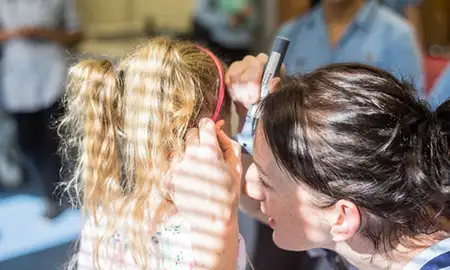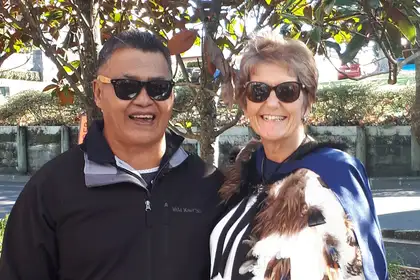
Kate Te Pou and her husband Tuiringa at Massey graduation for her Master in Nursing in 2021.
Kate says it’s about the journey, no matter how long it takes, that brings you to your true calling.
“I deviated off course several times. You might have to put your dream on hold but if you’ve got a vision, it doesn’t matter. Even if life side-tracks you, that still makes you who you are. It gives you those experiences and builds you up.”
Kate’s nurse training began in 1986, after which she enrolled with Massey University in the late 90s with a plan to become a Nurse Practitioner (NP) in the Bay of Plenty. Returning to Massey in 2018 to complete her Master of Nursing and a postgraduate certificate for the NP training pathway, she says she was welcomed back to an institution that recognised the wealth of experience she was bringing with her.
“That’s what I love about Massey, they leave the door open and support you along the way. They looked at what I had done in the space since I left and said, ‘Come on back! You’ll be fine!’ And I was.”
Strong foundations
From an early age, Kate wanted to be a nurse. She spent much of her early childhood in hospital due to asthma and survived two paediatric arrests, with her health care experiences giving her a deep appreciation for the nurses that cared for her.
Graduating from Waiariki Polytechnic (now Toi Ohomai Institute of Technology) as a comprehensive registered nurse in 1989, Kate’s journey saw her moving from general surgery into critical care during her 12 years at Whakatane Hospital. She completed a Bachelor of Health Science (Nursing) with Charles Sturt University in Australia in 1997, then began her Master of Nursing with Massey in 1999.
Kate took a pause in 2001 to move to the United Kingdom with her family, originally for a year, to explore her mother’s heritage. In the six years that passed, Kate worked as a nurse manager in an Intensive Care Unit (ICU) and resumed a master’s programme in Clinical Health Care Practice with the University of Oxford. This supported her path to work in a NP-led outreach programme, essentially ICU without walls.
When she moved back to the Waikato in 2007, Kate realised their health care system was not yet in a place where a similar outreach project could be established.
“I sort of gave up on my dream of becoming a nurse practitioner, I moved to Hawke’s Bay in 2011 and continued to work in the ICU down here. An opportunity came up to become a Respiratory Clinical Nurse Specialist and I thought with my childhood, and my critical care experience, this would be a great time to move into this new space.”
Seeing the big picture
In 2018, Kate returned to her studies with Massey, where she was tasked with creating a Māori model of health care for a summer school course.
“It was a real lightbulb moment because it was relationship-centred. In whakawhanaungatanga, establishing relationships in a Māori context, you must give a little of yourself – this is who I am, and this is where I come from – to develop a connection, instead of just taking their name, their identity, their personal history in a one-sided relationship. I have always gone against the grain of traditional health models of remaining detached, so this reaffirmed how I practiced for all those years in nursing.”
Kate’s Te Manawa o Te Ora/The Breath of Life concept emphasised the importance of developing meaningful connections between tapuhi (nurse), tāngata whaiora (person seeking health), and their whānau. Kate received top marks in this paper and stood out to Professor Karen Hoare who invited Kate into the NP programme.
“I wanted to become a nurse practitioner in long term care with a respiratory focus looking at the whole person and their health. Studies around long term, multiple conditions show that whaiora and whānau want consistency and continuity of care, ideally by working with the same person,” Kate says.
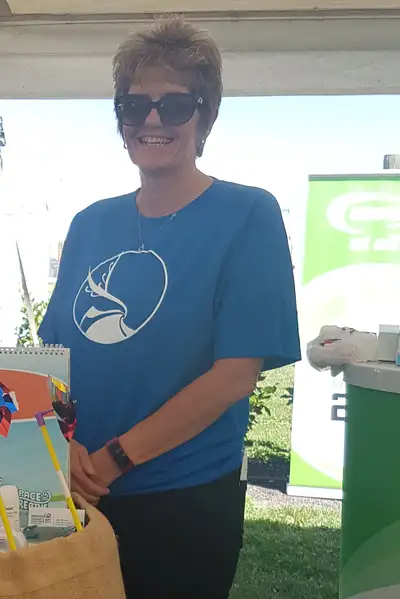
Kate presenting an interactive respiratory health display at the Hauora tent at Te Matatini
The support to persevere
In 2021, with the help of a scholarship granted by Head of the School of Nursing Professor Nicolette Sheridan, Ngāpuhi, Kate began what she describes as the hardest year of her study life. It was the encouragement offered by her Massey whānau that saw her through.
“The pressure was on. There’s so much to be done and you’ve got one year to develop the skills and knowledge to make you a safe and competent nurse practitioner. There were tears – many tears! But I got reassurance from my nurse practitioner mentors in Hawke’s Bay and by the Massey staff, especially from my academic supervisors Victoria Perry and Professor Karen Hoare.”
One of the biggest sources of strength for Kate was the mentors who were passionate about doing more to improve the NP space. She lists Professor Hoare and Dr Alison Pirret as two of her many role models.
“I would just be looking at these giants in the nurse practitioner world thinking, wow, I want to be like you one day, I want to be influential and make change. Throughout the struggles, I was being uplifted by seeing these amazing people at Massey. Massey exposes you to big thinkers, people moving in amazing spaces.”
Kate is grateful for the time she had at Massey and how it brought her back to her original path.
“I’m glad I continued with my studies and I’m glad that Massey invited me for my worth because I had given up on my vision. When Professor Hoare rang me and invited me that first year, it really helped to feel like somebody saw my potential.”
A real highlight was graduating with her Master of Nursing in 2021.
“I have the photos from the ceremony, and I can see Dr Pirret and Professor Hoare clapping for me, and it’s so moving because these are my giants and they’re applauding me. Graduation was such a special moment and I’m so glad in amongst the craziness last year, I got to celebrate with both my family and the extended Massey whānau.”
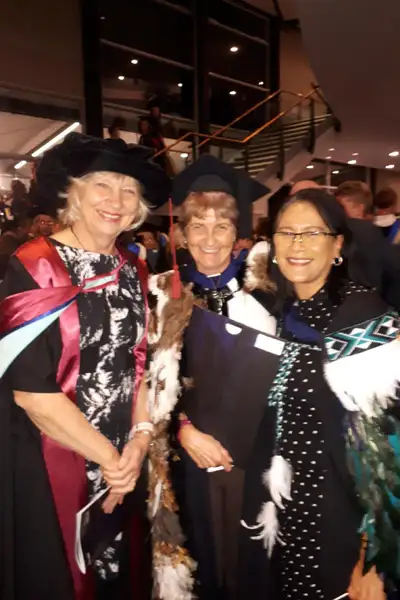
Professor Karen Hoare, Kate, and fellow graduate Pam Rudolph at Massey Graduation 2021
Strength from whānau
Kate is currently working in Hawke’s Bay as a qualified and registered Nurse Practitioner in long-term care with an expertise in respiratory health and is set to graduate with her postgraduate certificate in May. She contributes a lot of her success in completing it to the people around her.
“You can’t do it on your own. I had an amazing husband who not only cooked for me all year but gave me the space I needed to study seven days a week. You’ve got to have loving people at home that care and support you.”
Kate and her husband, Tuiringa, Ngāi Tūhoe, have seven children between them, and 22 mokopuna. Spread out across New Zealand and Australia, Kate’s favourite pastime is travelling around to spend time with her whānau.
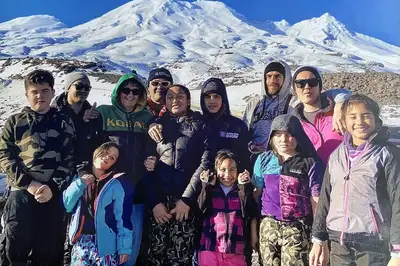
Kate and her whānau enjoying a snow holiday in 2020.
Kate is a Tararā Māori, the name given by Ngāpuhi for those who descend from Māori and Dalmatian heritage. Although not raised within her biological father’s whānau, she says she’s grateful for the support and teachings she received as a whāngai being raised within Tūwharetoa and by marriage into Ngāi Tūhoe. This inspired an essence of the he tāngata principle in everything she does.
“I’ve had aunties for years going ‘When are you going to become Dr Kate?’ but now I can say, I’ve become an equivalent of what my aunties would call a doctor. It’s because of having those conversations at the marae that inspired me to ask myself, ‘What can you do for the people?’”
Looking to the future
Despite Kate’s long and rich journey, she still considers herself a junior within the field and has a lot more she wants to achieve.
“If I change one thing, it will be to make sure that nurse practitioners of the future have cemented pathways to come into. It’s about getting people to see their own worth, stepping up their clinical work whether in primary or secondary care, and bringing them forward to work in this amazing role.”
The NP field, while well-established overseas, is still a rising profession in New Zealand with the first NP being registered in 2001.
“It took years to get to the first 100 nurse practitioners. It’s starting to get momentum, now we’re at 604 which is one per cent of the clinical nursing field. As one of 24 of Māori decent, we make up four per cent of the NP workforce.
“We have to do so much more to prove our worth in this space, to change the mind of the medical model to a holistic Whānau Ora model – it’s a big piece of work," Kate says.
When asked if she had any advice for people considering a career as a NP, or considering further study, Kate says, “Just don’t give up – it doesn’t matter how hard it is or if it takes you 20 odd years like me, don’t give up because life’s still a journey. And Massey took me back!”
Related news
From sky high to bedside
A medical incident onboard a flight spurred Master of Clinical Practice (Nursing) student Stacey Boyce to return to study.
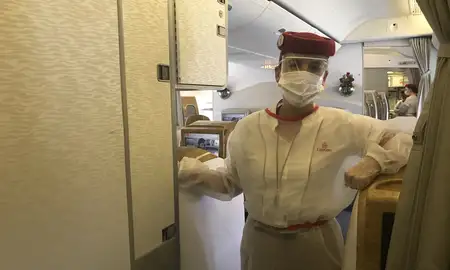
Massey graduate is Wellington’s first Pacific Nurse Practitioner
Catherine Tu'akalau is Wellington's first Pacific Nurse Practitioner and one of only a handful in Aotearoa New Zealand specialising in child health.
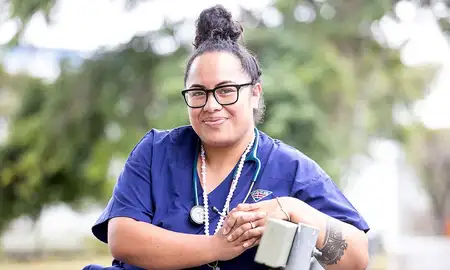
Massey's nursing school in the world's top 100 to 150
Head of the School of Nursing, Professor Nicolette Sheridan (Ngāpuhi) says international rankings are important to the school's key stakeholders, students, staff, and external partners to demonstrate the school's improved performance.
